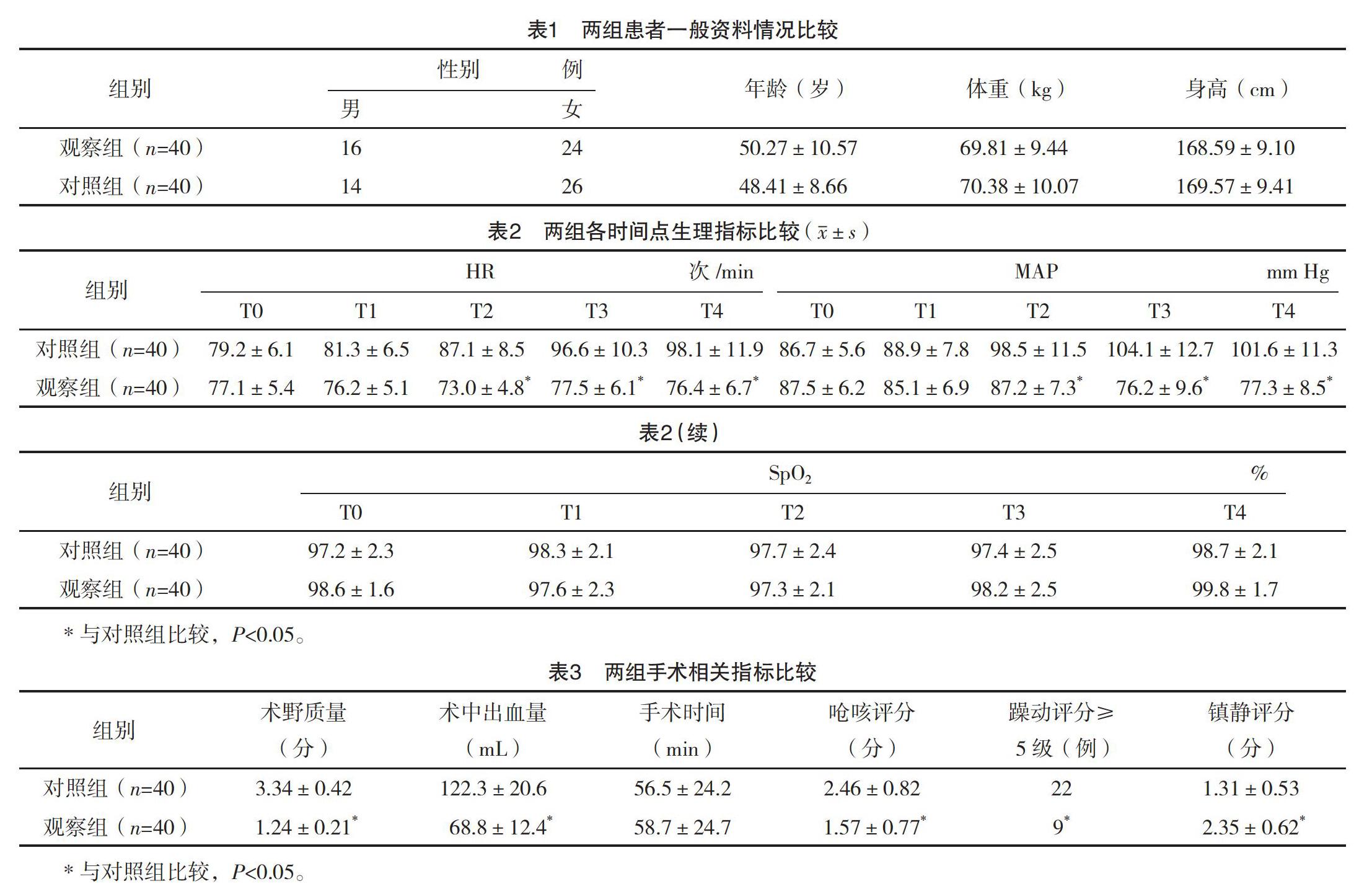右美托咪定在鼻内镜手术中的应用及对出血、应激反应的影响
2019-01-14于霖庾燕君韩琪廖永强
于霖 庾燕君 韩琪 廖永强

【摘要】 目的:探討右美托咪定在鼻内镜手术中的应用及对出血、应激反应的影响。方法:选择2017年9月-2019年1月行鼻内镜手术的患者80例,按随机数字表法分为观察组与对照组,各40例。两组均静脉注射丙泊酚2 mg/kg,芬太尼0.2 mg,阿曲库铵0.6 mg/kg;观察组给予右美托咪定0.5 μg/kg以60 mL/h速度注射并以0.5 μg/(kg·h)维持至术毕,而对照组给予相同剂量的0.9%氯化钠溶液。观察并记录两组进入手术室(T0)、气管插管前(T1)、气管插管后(T2)、拔除气管插管1 min(T3)、拔除气管插管5 min(T4)的平均动脉压(MAP)、心率(HR)及SpO2。比较两组术野质量、术中出血量、手术时间、呛咳评分、躁动评分≥5级以上例数及Ramsay镇静评分。结果:观察组在T2~T4时的HR与MAP均低于对照组(P<0.05);观察组术野质量优于对照组(P<0.05),观察组术中出血量少于对照组(P<0.05);观察组呛咳评分、躁动评分≥5级以上例数及Ramsay镇静评分均低于对照组(P<0.05)。结论:鼻内镜手术中应用右美托咪定可以稳定HR和MAP,减少术中出血量,降低患者的应激反应,值得临床推广。
【关键词】 右美托咪定 鼻内镜手术 术中出血量 血流动力学
[Abstract] Objective: To investigate the application of Dexmedetomidine in endoscopic surgery and its influence on hemorrhage and stress response. Method: A total of 80 patients underwent endoscopic nasal surgery from September 2017 to January 2019 were selected and divided into observation group and control group according to the random number table method, 40 cases in each group. Propofol 2 mg/kg, Fentanyl 0.2 mg and Atracurium 0.6 mg/kg were injected intravenously in both groups. The observation group was given Dexmedetomidine 0.5 μg/kg at a rate of 60 mL/h and maintained at 0.5 μg/(kg·h) until completion of the surgery, while the control group was given the same dose of 0.9% Sodium Chloride Solution. The average arterial pressure (MAP), heart rate (HR) and SpO2 in the two groups were observed and recorded before entering the operating room (T0), before endotracheal intubation (T1), after endotracheal intubation (T2), after endotracheal intubation was removed for 1 min (T3), and after endotracheal intubation was removed for 5 min (T4). The quality of the surgical field, the intraoperative blood loss, the operation time, the cough scores, the number of patients with agitation score≥5 and Ramsay sedation scores were compared between the two groups. Result: The HR and MAP of the observation group at T2-T4 were both lower than those of the control group (P<0.05). The quality of operative field in the observation group was better than that in the control group (P<0.05). The intraoperative blood loss in the observation group was lower than that in the control group (P<0.05). The cough score, the number of patients with agitation score≥5 and Ramsay sedation score in the observation group were lower than those in the control group (P<0.05). Conclusion: The application of Dexmedetomidine in nasal endoscopic surgery can stabilize HR and MAP, reduce the intraoperative blood loss and the stress response, it is worthy of clinical promotion.
